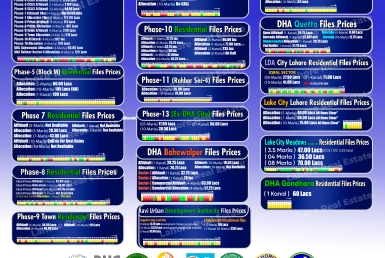Did New Tax Affect the Property Market? | Budget 2024-25 Complete Guide

Unmask the mysteries surrounding Pakistan’s Budget 2024-25 and its impact on real estate investments. Learn about Active Filers, Non-Filers, Late Filers, tax rate changes, and how to navigate the new landscape
Pakistan Budget 2024-25: Understanding Tax Implications for Real Estate Investors (Active Filers, Non-Filers, Late Filers)
The recent budget in Pakistan introduced a new term, ‘Late Filer’, which has sparked questions among taxpayers. This article aims to clarify the distinctions between active filers, non-filers, and late filers and their implications for taxation.
Active Filers
Active filers are individuals or entities that submit their income tax returns within the prescribed deadline, without incurring any late filing penalty charges. In Pakistan, the filing period typically lasts from July 1st to September 30th, with an initial period of 90 days. Active filers are considered reliable taxpayers and are eligible for certain benefits and tax privileges.
Non-Filers
Non-filers are individuals or entities that fail to submit their income tax returns or have not submitted their previous returns. As a result, they are not considered active taxpayers and face higher tax rates on transactions such as property purchases and sales, capital gains, and investments. Additionally, the Federal Board of Revenue (FBR) is authorized to block Sims of non-filers.
Late Filing (Late Active Filers)
Late filers are individuals or entities that submit their income tax returns after the prescribed deadline. When they file their returns, they must also pay a late filing penalty charge. While they are considered active taxpayers, they are subject to higher tax rates than regular active filers but lower than non-filers.
Implications of Late Filing
Late filers are subject to increased tax rates on:
- Property purchases and sales
- Capital gains
- Investments in National Savings or savings accounts
Additionally, the higher tax rates may also apply if late filers attempt to conduct transactions such as buying or selling vehicles or property.
Avoiding Late Filing Status
To avoid being classified as a late filer, it is crucial to:
- Submit your income tax returns within the prescribed deadline.
- Engage the services of a qualified tax consultant to minimize errors and avoid future penalties.
- Stay informed about tax updates and consult with your tax consultant regularly.
Importance of Tax Filing
Being a tax filer is essential in Pakistan for various reasons, including:
- Facilitating financial transactions
- Applying for visas
- Opening bank accounts
- Investing in savings and National Savings
- Purchasing property
Did New Tax Affect the Property Market? | Budget 2024-25 Complete Guide
The recent Pakistani budget has sparked some apprehension among property investors and real estate agents. This article aims to clarify the new regulations, dispel myths, and provide a comprehensive understanding of the revised tax structure.
Understanding File Return
Filing a tax return does not imply paying taxes but rather declaring your income to the FBR. Individuals with incomes below the taxable threshold can submit a ‘Nil’ return. However, we all pay taxes on our electricity bills, mobile bills, vehicle taxes and also on property sell/purchase etc. If we’re non-filers then all these taxes are wasted and could not be claimed. While the filer can claim/refund all these taxes through our tax return.
Myth-busting: Gain Tax
The term ‘gain tax’ is frequently misused. Under Section 236C, a 3% withholding tax is collected at the time property transfers. This is not the actual gain tax, which is calculated and then adjusted at the end of the financial year based on the realized gain.
Changes in Withholding Tax Rates (Section 236C)
The government has revised the withholding tax slabs for property sales. For properties valued up to PKR 50 million, the tax rate remains 3%. However, for properties valued between PKR 50-100 million, the rate increases to 3.5%, and for properties above PKR 100 million, it rises to 4%.
Late Filer Penalty
Late filers will incur a higher withholding tax rate, doubled for each category that will pay
- 6% instead of 3% (0 to 50 Million)
- 7% instead of 3.5% (50 to 100 Million)
- 8% instead of 4% (Above 100 Million)
Impact on the Real Estate Market
An analysis of property transactions reveals that over 80% of transactions fall from 0 to 50 million. Which has the same rates of withholding tax that is 3%. Only a small number of transactions involve properties valued above PKR 50 million, which now face slightly higher rates (3.5 %). Thus, the impact on the real estate market is minimal.
Gain Tax Changes
Previously, gain tax rates varied depending on the holding period of the property. The new budget proposes a flat 15% gain tax rate, regardless of the holding period. However, this applies only to properties purchased after July 1, 2024. Current transactions are not affected.
Federal Excise Duty
The budget introduces a 5% Federal Excise Duty on new plot allocations. This duty may be borne by developers and may be passed on to purchasers. However, 99% of current transactions do not involve new plot allocations and are therefore not impacted.
Conclusion
The recent tax changes have created some misconceptions but their actual impact on the real estate market is nominal. It is essential to rely on accurate information. By understanding the details of the new regulations, property investors can make informed decisions and navigate the market effectively.
READ MORE: https://lahorerealestate.com/pakistan-real-estate-tax-2024-25-will-prices-rise-or-fall/










Join The Discussion
You must be logged in to post a comment.